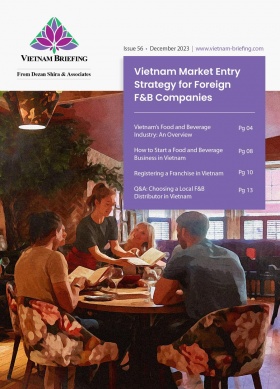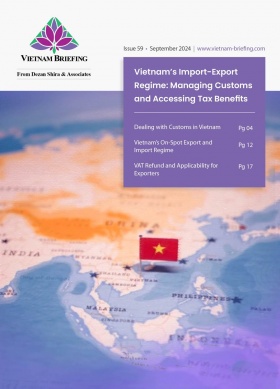Setting Up an FDI Company in Hung Yen Province, Vietnam
Hung Yen Province, located in northern Vietnam, has positioned itself as a promising destination for foreign direct investment (FDI), especially within its well-developed industrial zones.
The province offers a favorable investment environment with a strategic location near Hanoi, robust infrastructure, skilled labor availability, and strong government support. Investors interested in capitalizing on Vietnam’s manufacturing and industrial capabilities will find Hung Yen’s industrial zones an attractive proposition.
Below is an overview of key industries attracting investment, along with the procedural steps and documentation required for setting up an FDI company in the province.
Also Read: Hung Yen Rises as a Prime Destination for Foreign Investment in Vietnam in 2024
Procedures for establishing a foreign invested / FDI company in Hung Yen
Setting up an FDI company in Hung Yen requires following a structured legal process to ensure compliance with local regulations. The process can be broken down into four key stages:
1) Application for investment policy approval (if applicable):
This step is mandatory for certain large-scale projects or projects involving specific industries. Investors must obtain approval from the relevant authorities to ensure the investment aligns with the provincial/regional development goals.
The approval process involves submitting a detailed project proposal that outlines the nature, scope, and expected impact of the investment.
2) Application for the Investment Registration Certificate (IRC):
All foreign investors are required to obtain an IRC from either the Department of Planning and Investment (DPI) of Hung Yen Province or the Hung Yen Industrial Zone Management Board, depending on the project’s location (inside or outside industrial zones).
The IRC serves as the formal approval for the investor to proceed with the establishment and operation of their business in Vietnam.
3) Application for the Enterprise Registration Certificate (ERC):
After receiving the IRC, the next step is to register the enterprise with the Business Registration Office under the DPI. The ERC formally registers the foreign-invested entity as a legal business in Vietnam.
The ERC is essential for the company to legally operate, conduct business transactions, and engage with partners.
4) Post-establishment process:
Once the ERC is obtained, several additional tasks must be completed before the business becomes fully operational:
- Tax registration: The company must register with the local tax authorities.
- Bank accounts: Open corporate bank accounts in Vietnam for transactions.
- Operational licenses: Obtain any additional licenses or permits relevant to the industry.
- Compliance with labor laws: Register employees with social insurance and ensure adherence to labor regulations.
Note: Besides these steps, FDI companies must have two accounts: a trading account and a direct investment capital account (DICA). Therefore, FDI enterprises need to open these accounts after establishing their businesses.
Authorities responsible for issuing certificates
The type of investment project and its location determine which authority will issue the necessary certificates for FDI projects.
Department of Planning and Investment of Hung Yen Province:
- Issues Investment Registration Certificates for projects located outside industrial zones, export-processing zones, high-tech zones, and economic zones.
- Address: No. 8 Chua Chuong, Hien Nam Ward, Hung Yen City, Hung Yen Province.
Hung Yen Industrial Zone Management Board:
- Issues Investment Registration Certificates for projects located inside industrial zones, export-processing zones, high-tech zones, and economic zones.
- Address: Nguyen Van Linh Street, Ban Yen Nhan Ward, My Hao Town, Hung Yen Province.
Business Registration Office:
- Under the Department of Planning and Investment, this office issues Enterprise Registration Certificates for all FDI companies in the province.
Documentation required for establishing an FDI company
For the Investment Registration Certificate (IRC):
- Application form for the execution of the investment project (regulated form).
- Legal documentation proving the investor’s legal status (e.g., business license, passport).
- Proof of financial capacity of the investor (e.g., bank statements, financial reports).
- Project proposal that details the scope, objectives, and expected outcomes of the investment.
- Additional documents depending on the type of project or industry, including environmental impact assessments or sector-specific permits.
For the Enterprise Registration Certificate (ERC):
- Enterprise registration application (regulated form).
- Company charter outlining the governance structure, scope, and capital distribution.
- List of members or founding shareholders, including foreign investors.
- Copies of legal papers for all members or shareholders (e.g., passports, company licenses).
- Original Investment Registration Certificate (IRC).
- Power of Attorney (if required).
Industrial parks in Hung Yen in 2024
As of 2024, Hung Yen Province is rapidly advancing its industrial development with the Prime Minister’s approval to build 17 industrial parks covering a total area of over 4,395 hectares. These industrial parks are part of the province’s strategy to transform into a modern industrial hub, attracting domestic and foreign investments, particularly in high-tech industries.
Currently, 10 industrial parks are operational, while the remaining 7 parks are under construction, positioning Hung Yen as a growing industrial destination in northern Vietnam.
Operational industrial parks in Hung Yen province:
- Phố Nối A Industrial Park
- Phố Nối Textile Industrial Park
- Thăng Long II Industrial Park
- Minh Đức Industrial Park
- Yên Mỹ Industrial Park
- Yên Mỹ II Industrial Park
- Minh Quang Industrial Park
- Sạch Industrial Park
- Industrial Park No. 3
- Industrial Park No. 5
These industrial parks are home to major investment projects, focusing on sectors like electronics, textiles, automotive, and technology manufacturing. For instance, Thăng Long II Industrial Park is a key site attracting high levels of foreign investment from multinational corporations, particularly from Japan and South Korea. These parks not only provide an ideal environment for large-scale production but also offer modern infrastructure and logistical support, contributing significantly to the region’s economic growth.
Key sectors for investment in Hung Yen’s industrial zones
Hung Yen is home to several key industries that are poised for growth. These sectors leverage the province’s industrial capacity, developments in infrastructure, skilled workforce, and proximity to logistics hubs, making them highly attractive for both domestic and foreign investors.
1) Automotive, mechanical, and agricultural machinery manufacturing:
- Scope: Production and manufacturing of cars, motorbikes, and agricultural machinery.
- Opportunity: Given Vietnam’s growing middle class and the increasing demand for personal vehicles and modern agricultural equipment, this sector offers significant growth potential for both export and domestic markets.
2) Electronics and information technology:
- Scope: Manufacturing electrical and electronic equipment, telecommunications devices, refrigeration units, office equipment, and technology software.
- Opportunity: As Vietnam becomes a regional electronics manufacturing hub, investments in this sector are supported by strong government incentives and growing global demand for electronics.
3) Biotechnology and agriculture:
- Scope: Production of agricultural goods, food processing, and leveraging biotechnology to enhance agricultural efficiency and food safety.
- Opportunity: Vietnam’s agricultural sector is evolving with the use of advanced technologies to increase productivity and ensure food security. Investors in food processing and biotechnology will benefit from this modernization trend.
4) Consumer goods and household appliances:
- Scope: Production of consumer goods, household appliances, and electronic devices.
- Opportunity: The rising demand for consumer electronics and home appliances in Vietnam and its neighboring countries presents an excellent market for expansion.
5) Building materials:
- Scope: Manufacturing of ceramics, packaging, paper, and other construction-related materials.
- Opportunity: With Vietnam’s rapid urbanization and infrastructural development, the demand for high-quality building materials is on the rise, opening opportunities for manufacturers in this sector.
6) Industrial synthesis:
- Scope: General industrial production for a wide range of goods and services catering to both domestic and international markets.
- Opportunity: The broad industrial synthesis sector allows for flexible production and caters to diverse industrial needs, making it appealing to investors with a focus on scalable manufacturing.
Hung Yen Prioritizes Supporting Industries
In its plan for 2025, Hung Yen targets enhancing the development of its supporting industries so that the province can manufacture and supply materials, components, and spare parts for a number of domestic industries. By 2030, Hung Yen’s supporting sectors will participate in global supply chains. The prioritized supporting sectors are:
- Mechanical manufacturing;
- Electrical and electronic equipment;
- Textile;
- Leather and shoes;
- Automotive manufacturing and assembling; and
- High-tech.
Hung Yen’s economy in 2024: January-September period shows strong performance
With sustained industrial growth and rising public investment, Hung Yen’s economy in 2024 continues to show promising prospects for the future.
In the first nine months of 2024, Hung Yen Province experienced notable economic growth, achieving an estimated 8.07 percent increase, according to the provincial statistics office. This robust performance was driven by multiple sectors:
- Agriculture: This sector saw modest growth of 1.71 percent, reflecting the steady development of farming and related activities.
- Industry and construction: The industrial and construction sectors surged by 10.93 percent, powered by the rapid expansion of industrial enterprises. Key sectors such as electronics and computers rose by 37 percent, precast metal products by 23 percent, pharmaceuticals by 20 percent, motor vehicles by 15 percent, and furniture by 25 percent. Major construction projects, like the urban developments in Vinhomes Ocean Park Hung Yen and Ecopark Van Giang, bolstered growth, alongside increased public investment in civil engineering projects.
- Commerce and services: This sector expanded by 2.59 percent, contributing to overall economic stability.
- Product taxes minus subsidies: An increase of 10.72 percent further enhanced the province’s economic performance.
Budget revenues reached over 30 trillion VND (approx. US$1.2 billion), marking a 26.78 percent year-on-year rise. Domestic revenue, driven by strong internal economic activity, totaled 27 trillion VND, while export-import revenues rose 25 percent, contributing 3.28 trillion VND.
Also Read: Manufacturing in Hung Yen, Vietnam: Key Advantages and 2021-2030 Master Plan
Conclusion
Hung Yen Province offers a wealth of opportunities for foreign investors, particularly in high-growth sectors such as automotive, electronics, biotechnology, and consumer goods manufacturing. The province’s well-established industrial zones, coupled with a supportive regulatory environment, provide a conducive atmosphere for business expansion. By following the outlined procedures and ensuring all required documentation is in place, investors can establish a strong foothold in one of Vietnam’s promising industrial regions.
Foreign investors are advised to engage local legal and consultancy services to ensure compliance with Vietnamese regulations and smooth establishment in Hung Yen. For queries on doing business in Vietnam or starting business operations in Hung Yen province, please reach our professionals on the ground by emailing at Vietnam@dezshira.com.
(With inputs from Vu Nguyen Hanh.)
About Us
Vietnam Briefing is published by Asia Briefing, a subsidiary of Dezan Shira & Associates. We produce material for foreign investors throughout Asia, including ASEAN, China, and India. For editorial matters, contact us here and for a complimentary subscription to our products, please click here. For assistance with investments into Vietnam, please contact us at vietnam@dezshira.com or visit us at www.dezshira.com.
Dezan Shira & Associates assists foreign investors throughout Asia from offices across the world, including in Hanoi, Ho Chi Minh City, and Da Nang. We also maintain offices or have alliance partners assisting foreign investors in China, Hong Kong SAR, Dubai (UAE), Indonesia, Singapore, Philippines, Malaysia, Thailand, Bangladesh, Italy, Germany, the United States, and Australia.
- Previous Article Hung Yen Rises as a Prime Destination for Foreign Investment in Vietnam in 2024
- Next Article Vietnam’s Natural Resource Tax 2024






























